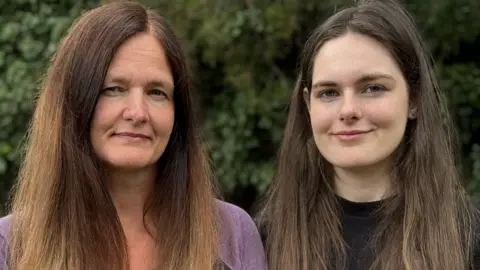'Young people's views on welfare reforms ignored'
 BBC
BBCThe government is failing to listen to young people with disabilities in shaping welfare reforms, a Shropshire teenager has said.
Jess Young, 19, said ministers had become too focused on employment rules within reforms and the mantra "those that can work, must work" had angered her and other teenagers with disabilities.
Under the government's benefits bill, people aged under 22 will no longer qualify for the health element of universal credit.
Defending the proposals, a government spokesperson pointed to steep rises in the numbers claiming benefits and said making changes was the only way to ensure the system remained sustainable in the future.
Jess, from Shrewsbury, has epilepsy and is autistic and is unable to work after leaving college so receives personal independence payments (Pip) and universal credit.
She told the BBC she wanted to work to feel like she was contributing.
"Some days I can't get up in the morning, I can't move so it's like other people deciding what I can and can't do, which is quite frustrating," she said.
"It feels like I don't have a voice and, actually, when I was in college, I was pushed to the edge and physically ill."

Last week, the government won a vote on its benefits bill by 75 votes, but only after offering last-minute concessions to Labour rebels.
Ministers had already watered down their plans once by reversing some cuts to universal credit and protecting current claimants of Pip from stricter eligibility rules.
People with a limited capacity to work because of a disability or long-term sickness, get a universal credit top-up payment.
While the top-up is being cut for new claims, the basic rate of universal credit will start to rise from about £92 a week in 2026 to £106 a week by 2030.
Hayley Young, Jess's mother, said the payment was an essential part of budgeting for families of children with Special Educational Needs and Disabilities (Send) as they navigated wrap-around care.
"Jess gets by with her struggles through connecting with the community and that involves community groups... which cost money and there's counselling too," she said.
"If she couldn't connect in the way that she does, it would be great disservice to her."

Shropshire Parent Carer Council (PACC), which is briefing about 1,500 Send families on the welfare reforms, has concerns that future claimants will struggle financially with their families forced to cut spending elsewhere.
That is despite ministers saying that no Pip rules would change until they had had time to consider the conclusions of a review.
"It's really important that people have accurate information, because when there is so much information coming out, it's just really overwhelming and scary," said Sarah Thomas, a trustee of the Shropshire group.
"I absolutely agree that anybody should be supported to have the best opportunity to work, but the rate of employment for people with autism is 30% and 6% with a learning disability," she added.
"I talk to parents every day who say we would love our children to have a future that includes employment, but it's just not realistic at the moment because the support to make that happen isn't there."
Ministers said the current set-up left people dependent on welfare, without giving them proper help to find work.
While Jess's benefits are unlikely to be affected in the short term, she is concerned that young adults might lose out substantially in future.
"It's evident sometimes that people in power are talking about things they don't understand," she said.
"So I think it's important to hear from people experiencing disability and hear their stories rather than speaking for people.
"I worry for them, because they do want to work but face a daily struggle.
"They're not going to get support and I think it's unfair. I want them to experience good change, not go further backwards."
Follow BBC Birmingham on BBC Sounds, Facebook, X and Instagram.
